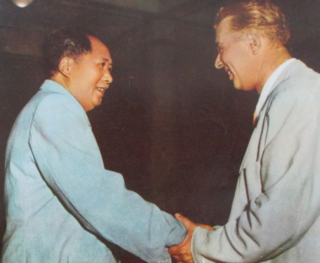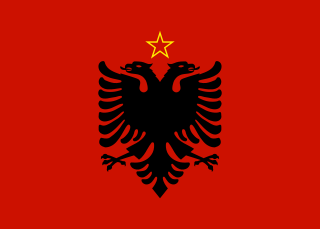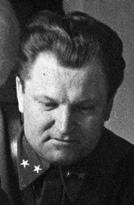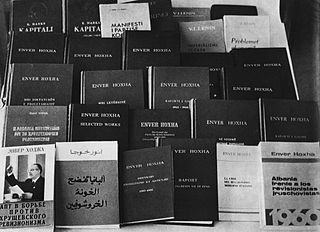
Enver Halil Hoxha was an Albanian politician who was the leader of Albania from 1944 until his death in 1985. He was First Secretary of the Party of Labour of Albania from 1941 until his death in 1985, a member of its Politburo, chairman of the Democratic Front of Albania, and commander-in-chief of the Albanian People's Army. He was the 22nd prime minister of Albania from 1944 to 1954 and at various times was both foreign minister and defence minister of the country.
Kommunistiska Partiet i Sverige was a pro-Albanian communist party in Sweden. KPS was formed in 1982. It was dissolved in 1993.

The Party of Labour of Albania (PLA), also referred to as the Albanian Workers' Party (AWP), was the ruling and sole legal party of Albania during the communist period (1945–1991). It was founded on 8 November 1941 as the Communist Party of Albania but changed its name in 1948. The party was dissolved on 13 June 1991 and succeeded by the Socialist Party of Albania. For most of its existence, the party was dominated by its First Secretary, Enver Hoxha, who was also the de facto leader of Albania.

The Communist Party of Sweden is a Marxist–Leninist communist party in Sweden and continuation of Workers' Party – The Communists.

The Sino-Albanian split was the gradual worsening of relations between the People's Socialist Republic of Albania and the People's Republic of China in the period 1972–1978.

The People's Socialist Republic of Albania, officially the People's Republic of Albania from 1946 until 1976, was the one-party communist state in Albania from 1946 to 1991. It succeeded the Democratic Government of Albania (1944–1946).

Albania and China established diplomatic relations on November 23, 1949. Albania has an embassy in Beijing and China has an embassy in Tirana.

Hysni Kapo (1915–1979) was an Albanian military commander and leading member of the Party of Labour of Albania. A member of the Communist Youth group, Kapo was first distinguished as an artillery commander in the Battle of Drashovica. In 1941 he was elected as a representative of the Youth group in the provisional central committee of the party and from 1956 until his death in 1979, he served as secretary of the central committee of the labour party. Hysni Kapo served in many ministerial positions and was a member of the Politburo of the Party of Labour of Albania from 1948 to his death. In the 1960s he played an important role in the emancipation of women in Albania during the cultural revolution of the era, and is remembered as a trusted man of the Albanian communist leader Enver Hoxha.
The Albanian–Soviet split was the gradual deterioration of relations between the Union of Soviet Socialist Republics (USSR) and the People's Republic of Albania, which occurred in the 1956–1961 period as a result of Soviet leader Nikita Khrushchev's rapprochement with Yugoslavia along with his "Secret Speech" and subsequent de-Stalinization, including efforts to extend these policies into Albania as was occurring in other Eastern Bloc states at the time.

Aleksey Illarionovich Kirichenko was a Soviet Ukrainian politician, who was the first ethnic Ukrainian to head the republic's communist party during the Soviet era. Between 1957 and 1960, he was a Secretary of the Central Committee of the Communist Party of the Soviet Union and the second-highest-ranking official within the party after Nikita Khrushchev.

The World Federation of Democratic Youth (WFDY) is an international youth organization, and has historically characterized itself as left-wing and anti-imperialist. WFDY was founded in London in 1945 as a broad international youth movement, organized in the context of the end of World War II with the aim of uniting youth from the Allies behind an anti-fascist platform that was broadly pro-peace, anti-nuclear war, expressing friendship between youth of the capitalist and socialist nations. The WFDY Headquarters are in Budapest, Hungary. The main event of WFDY is the World Festival of Youth and Students. The last festival was held in Sochi, Russia, in October 2017. It was one of the first organizations granted general consultative status with the United Nations Economic and Social Council.

Hoxhaism is a variant of anti-revisionist Marxism–Leninism that developed in the late 1970s due to a split in the anti-revisionist movement, appearing after the ideological dispute between the Chinese Communist Party and the Party of Labour of Albania in 1978. The ideology is named after Enver Hoxha, a notable Albanian national-communist leader, who served as the First Secretary of the Party of Labour.

On 5–17 June 1969, an International Meeting of Communist and Workers Parties was held in Moscow. The meeting occurred in the aftermath of the Sino-Soviet split and the Soviet intervention in Czechoslovakia. The preceding international meeting, held in Moscow in 1960, had been dominated by disputes between the Communist Party of the Soviet Union on one hand and the Communist Party of China and the Party of Labour of Albania on the other. By this time the split between the two poles had been finalized. Pro-Chinese elements were absent from this event. However the phenomenon of Eurocommunism had begun to emerge, which was notable amongst some of the delegations present.
The Swedish–Albanian Association was a Swedish friendship association, founded during the Cold War to support the People's Socialist Republic of Albania and the Party of Labour of Albania, and to build Swedish-Albanian cultural relations. The group, among other activities, translated and published the works of Albanian leader Enver Hoxha - among them Imperialismen och revolutionen (1979) on the subject of the Sino-Albanian split - as well as books on Albanian culture, tourist guide books, and a novella by the author Dhimitër Shuteriqi. The Swedish-Albanian Association's Bulletin and Albania and Us were two regular publications.
An International Meeting of Communist and Workers Parties was held in Moscow, Soviet Union, November 16–19, 1957. The meeting was attended by 64 political parties from all over the world. The meeting was the first of its kind, marking a new form of forum for the world communist movement following the disbanding of the Communist International (Comintern) and the Information Bureau of the Communist and Workers' Parties (Cominform). Four additional parties attended clandestinely out of fear of repercussions at home.

The Bucharest Conference of Representatives of Communist and Workers Parties and the Conference of Communist and Workers Parties of the Socialist Countries were two meetings of communist parties held in Bucharest, Romania on June 24–26, 1960. The conferences were held on the side-lines of the Third Congress of the Romanian Workers Party, held June 20–25, 1960.

Diplomatic relations between Albania and North Korea were established on November 28, 1948, over one and a half months after the DPRK was proclaimed. The communist governments of Enver Hoxha and Kim Il Sung were often compared for their similarities in their diplomatic isolation and Stalinist-style regimes.














